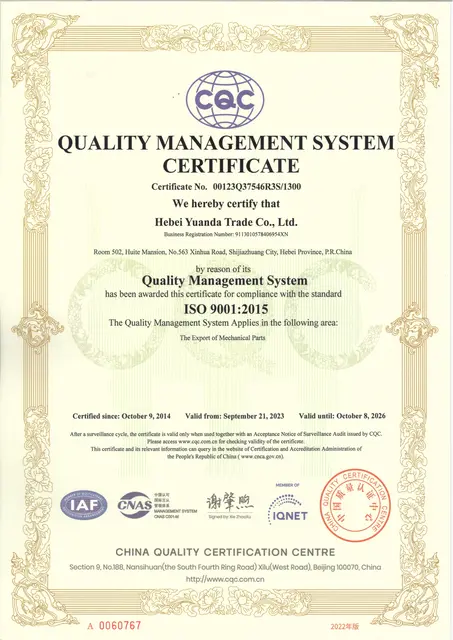Mobile:+86-311-808-126-83
Email:info@ydcastings.com
Aluminum Casting Foundry Solutions for High-Quality Metal Fabrication and Production
The World of Aluminum Casting Foundries
Aluminum casting foundries play a crucial role in the manufacturing industry, transforming raw aluminum into various intricate shapes and components that cater to a myriad of applications. As the demand for lightweight, corrosion-resistant materials continues to rise across multiple sectors, the importance of aluminum casting foundries has never been more pronounced.
Aluminum is favored in manufacturing due to its excellent properties, including a high strength-to-weight ratio, good thermal and electrical conductivity, and resistance to corrosion. These attributes make aluminum a preferred choice in industries ranging from automotive and aerospace to consumer goods and construction. Thus, the aluminum casting process is integral to producing components that meet the rigorous standards required in these fields.
The World of Aluminum Casting Foundries
Sand Casting is one of the oldest and most versatile methods. It involves creating a mold from sand and then pouring molten aluminum into it. This method is ideal for producing large, complex shapes and is often used in the automotive industry for making engine blocks and other heavy components. However, due to the rough surface finish that sand casting can produce, further machining may be required.
aluminum casting foundry

Die Casting, on the other hand, is known for its ability to produce high-volume, precision-engineered components. It uses steel molds and applies high pressure to force molten aluminum into the cavity, resulting in parts with excellent surface finish and dimensional accuracy. This method is commonly employed in the production of smaller, intricate parts for consumer electronics, appliances, and automotive applications.
Investment Casting—or lost wax casting—is another method where a pattern made of wax is coated with a ceramic material. Once the ceramic hardens, the wax is melted away, leaving a mold into which aluminum is poured. This process allows for complex geometries and fine details, making it popular in industries requiring high precision, such as aerospace and medical devices.
Quality control is paramount in aluminum casting foundries. Since the end products often serve critical functions, stringent testing and inspection protocols are enforced. These may involve non-destructive testing techniques to detect internal flaws, as well as dimensional inspections to ensure that components meet specified tolerances.
Sustainability is also a growing focus in the aluminum casting industry. With aluminum being highly recyclable, foundries are increasingly adopting practices to minimize waste and energy consumption. Many operations have implemented closed-loop systems that allow for the reuse of scrap aluminum, reducing the overall carbon footprint of the manufacturing process.
In conclusion, aluminum casting foundries are at the heart of modern manufacturing, providing essential services and products across various industries. As technology advances and sustainable practices become more prevalent, these foundries will continue to evolve, meeting the demands of an ever-changing market while contributing to a more sustainable future. The significance of aluminum casting lies not only in the components produced but also in the innovation and efficiency that drive the industry forward.
-
Why Is Choosing the Right Motor Housing Critical for Engine Performance?NewsJul.18,2025
-
Which Impeller Types Best Optimize Your Pump’s Efficiency?NewsJul.18,2025
-
Optimize Maintenance Efficiency with Durable Oil Catch SolutionsNewsJul.18,2025
-
Maximize Pump Performance with Precision-Engineered ComponentsNewsJul.18,2025
-
Elevate Industrial Flow Systems with Precision-Engineered ComponentsNewsJul.18,2025
-
Boost Durability and Functionality with Precision Power CastingsNewsJul.18,2025











